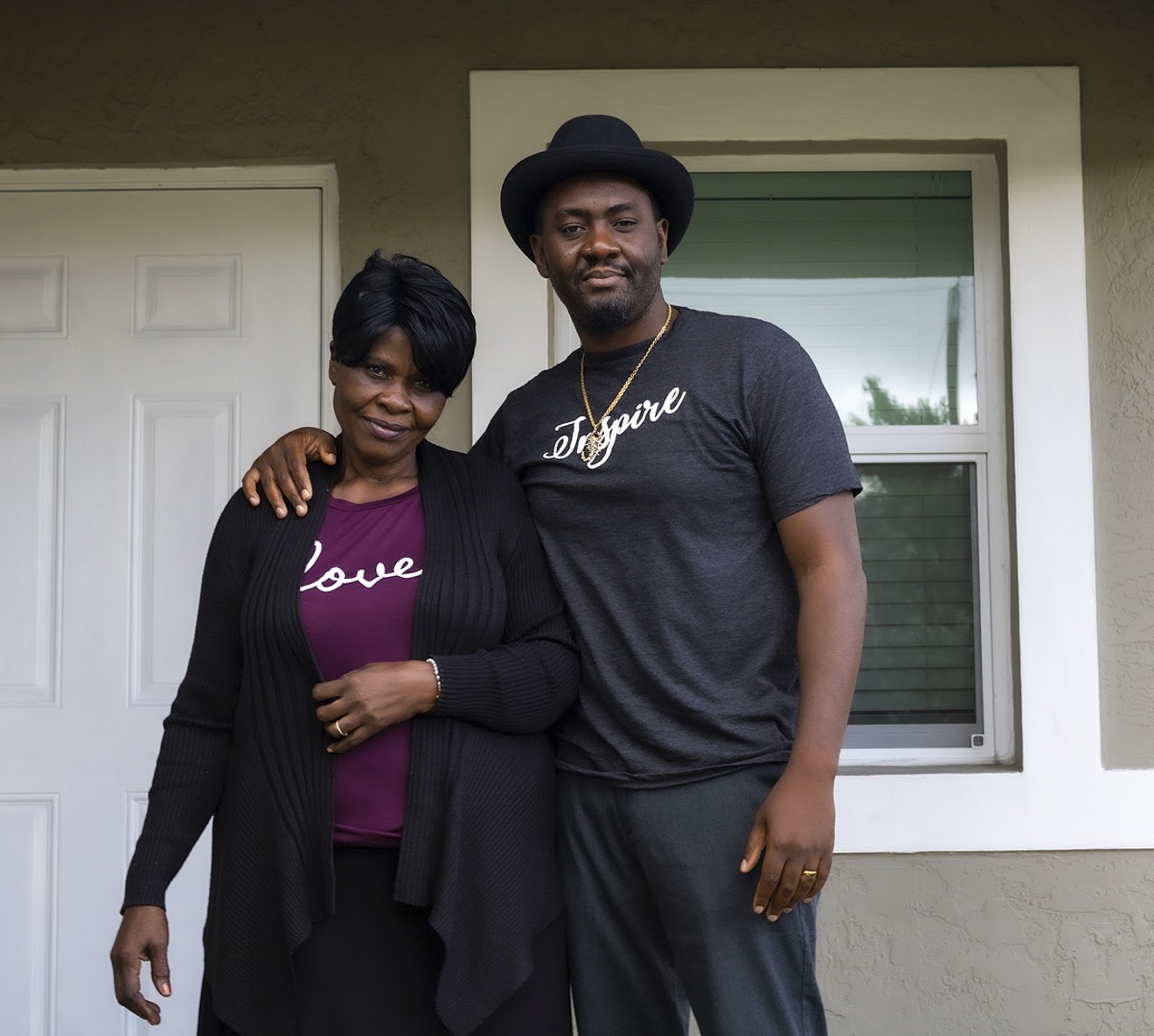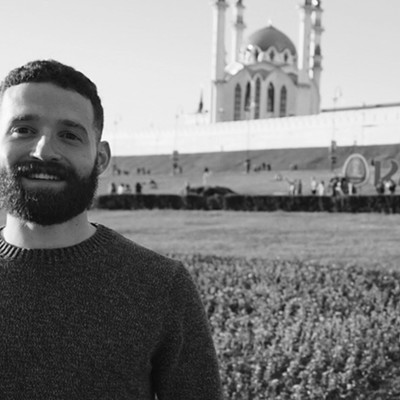The smell of dead bodies coming from the backyard was so thick it could stick to your throat. There they stood, neighbors and families huddled together in the dark, hours after Hurricane Dorian had thrashed itself tired against the old brick house. For nearly two days in early September, the storm bore down on Grand Bahama and the Abaco Islands, striking with 185 mph winds and storm surges as high as a two-story building. Tens of thousands of survivors were left desperate for aid in the storm's wake, as the flood waters receded to reveal bodies scattered amid the wreckage.
Degrace Pierre-Louis and her husband subsisted on saltine crackers and stale hope for several days after the storm as they took refuge with more than 15 others in a hilltop home in Marsh Harbour. Staying in the nearby shantytowns where Pierre-Louis lived most of her life would have been as good as a death sentence during the storm. For many, it was just that — Hurricane Dorian killed at least 70 people, while hundreds of undocumented people living in makeshift housing remain unaccounted for. The storm caused an estimated $3.4 billion in damage, leveling thousands of buildings, including the home of Pierre-Louis, who made her living selling breakfast from the front of her house to laborers on their way to work.
It took Pierre-Louis a week after Dorian's passing to find a way off Grand Abaco. And it would have been longer if not for her son, Lortir, who bought her a ticket on one of the last available flights to Fort Lauderdale, where she would stay with a relative. Sitting in the dimly lit living room of her niece's one-story home off West Sunrise Boulevard, Pierre-Louis shuddered while recalling the destruction left by Dorian and the stench reeking from the woods behind the brick Bahamian house where she took refuge during and after the storm. As time went by and no aid appeared, Pierre-Louis feared she might become a cadaver herself.
"If I have to live underneath a coconut... I could rough it. But I would have to send my mom somewhere."
tweet this
"I was distraught and cried because I couldn't get in contact with anyone. No one showed up to help," Pierre-Louis told New Times in her native Kreyol while using her son as a translator. "I survived the storm, but the days after almost killed me."
Pierre-Louis's plane ticket to Florida was one-way. The idea was to escape the islands — even if only temporarily — and she was far from alone. Thousands of evacuees piled onto ferries leaving the Bahamian capital of Nassau for Florida in the days after the storm. Most of those evacuees are believed to have returned to the islands. But as delays in recovery and reconstruction continue on the storm-stricken parts of the islands, hundreds of Bahamians have opted to remain in Florida.
One of them, Beverly Sands, says she has no intention of returning to the Bahamas anytime soon. Sands, along with her mother and teenage son, are among about 70 Bahamian evacuees staying an InTown Suites in West Palm Beach with the help of local charities and nonprofit organizations. At last count, more than 300 Dorian evacuees had registered with the Bahamian consulate in Miami, though consular officials admit the actual number of Bahamians residing in Florida is likely far higher. By mid-November, there were more than 510 Bahamian children enrolled in Miami-Dade, Broward, and Palm Beach public schools.
Unlike Pierre-Louis, Sands was fortunate to have been in Nassau with her mother and teenage son when Dorian hit. Sands got her family onto a Florida-bound ferry as soon as the severity of the destruction on Abaco and Grand Bahama became apparent.
For Sands, the choice to stay in Florida is simple. She has no home and no job to return to in the Bahamas. Nearly five months after Dorian made landfall, power outages remain the norm across parts of Great Abaco, and running water can still be hard to come by in certain areas. A single grocery store in Marsh Harbour opened late last year, but many on the island still depend on international aid for basic needs. Sands says her mother is of delicate health and wouldn't be able to withstand the rough lifestyle and insecurity back home.
Then there's her son, who is set to finish his senior year at a Palm Beach County high school in May. Sands says if they leave before the end of the school year, he won't receive credit for his time there — plus the public school system back in Abaco is not yet fully up and running.
"We're not getting any straight information... I feel forgotten."
tweet this
"Once my son has graduated, if I have to go home and live underneath a coconut while everything gets figured out, I could rough it. But I would have to send my mom somewhere. I don't know where," Sands says.
Florida has become a tedious sort of limbo for Bahamians such as Sands, who are unwilling to return to the ruins of their old homes but prohibited by law from working while residing stateside on tourist visas. Before Dorian, Sands was a waitress at a restaurant on Treasure Key, 20 miles north of Marsh Harbour. These days, she spends her time keeping up with news from the island and going on walks to a Walmart near the hotel. Staff at the hotel long ago learned the names of every evacuee, who by now have become almost bored with their surroundings. Sands describes a general restlessness among the group.
In the aftermath of Dorian, Florida lawmakers, including Democratic state Rep. Shevrin Jones, petitioned the federal government to assist Bahamian evacuees, first by requesting that certain visa requirements be suspended and then later by asking that Bahamians be allowed to work during their stays.

"The process has been slow because we have to wait on the federal government," says Jones, who adds he held conversations with Florida Sen. Marco Rubio about the Bahamian evacuees in late November. "These people want to provide for themselves and their families. We need to find a way to let them work temporarily. I want to make sure Bahamians come back on top."
Absent an intervention from the U.S. government, the best hope for evacuees such as Sands is a visa extension. On March 8, the Bahamians staying in the InTown Suites will lose legal status and financial support from Catholic Charities Palm Beach, which has pledged to cover their lodging until then. Associate director Alex Stevens says the organization will continue providing case management services to the evacuees who want to stay.
Aside from the attention from charities and the occasional check-in from officials from the Bahamian consulate, Sands says, the evacuees lead a largely lonely existence. She thinks her government isn't facing the reality that people like her aren't ready to return to the island.
"I just don't see that the government is doing as much as they should be... We're not getting any straight information; we're not getting much information at all," she says. "I feel forgotten."
In October, Bahamian Prime Minister Hubert Minnis advised evacuees in Florida to come back to help rebuild the islands; he guaranteed temporary accommodations to those returning to Great Abaco and Grand Bahama. However, the first temporary housing structures on Great Abaco were not erected until early December, according to a report by the Nassau Guardian. The Bahamian government plans to spend a total of $6.4 million to erect 250 temporary dome structures by the end of January. It's unlikely that will be enough to house the thousands who were left homeless by the storm.
Sands scoffs at her government's insistence that evacuees return. One thing's for sure: If Sands does go back, it won't be because of a sudden optimism about recovery on the island.
That was the case for Pierre-Louis, who returned to Great Abaco last month to rejoin her husband, a Haitian immigrant who couldn't leave the islands due to his legal status. Pierre-Louis is also Haitian-born but was naturalized as a Bahamian citizen. The couple is staying in the house of her husband's employer, but they plan to move to another plot of land because Dorian demolished the shantytown where they once lived. According to Lortir Pierre-Louis, his mother's decision to return had little to do with reconstruction efforts and everything to do with her family.
"My mother went back to the Bahamas in spite of recovery efforts from the government, which have been slow, not because of them," he says. "Her husband was there, and she missed her old life. But it wasn't because the islands were waiting for her with arms wide open."













